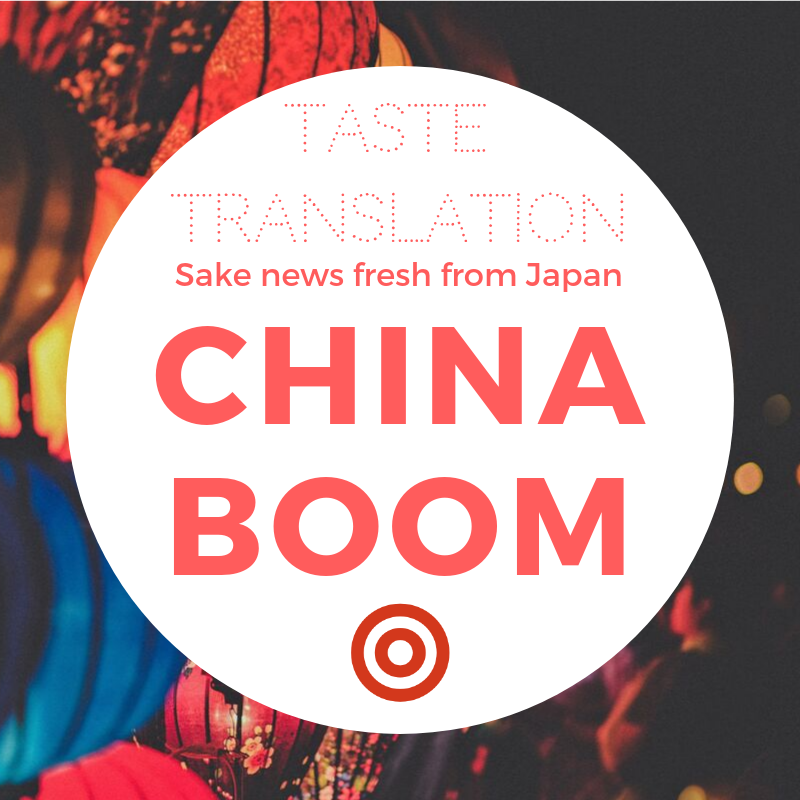
Takashi Funakoshi from the Asahi Shimbun China office has a long report in With News on the newfound popularity of sake in China. [This post is part 2 of 2.]
Of course, the current popularity of sake in China can’t be explained just by Japanese government policy. We asked a “sake sommelier” (kikisake-shi) qualified with the Sake Service Institute (SSI) about what else was behind this increasing interest in sake. They pointed out two possible causes: first, more Japanese restaurants. Japanese food has been available in Beijing and Shanghai for some time, but recently more are appearing in towns further inland, with names like “XX Sushi”, and the quality of food served is high. People want sake to drink with their sashimi.
Another factor is the increasing number of Chinese visitors to Japan, which means more people have tasted sake in Japan and come to appreciate it. They’re willing to pay a bit more to be able to keep drinking it when they come back to China. Plus, they added, Chinese baijiu is too strong for young people.
One more thing to consider is that sake is becoming popular with young people. One young Chinese fan who goes to a Japanese restaurant once or twice a month commented that people his age don’t want to drink baijiu, because it’s too strong. They find sake much more refreshing.
If you ask Japanese people for an example of a Chinese drink, many people will answer with shaoxing wine. However, this is only one type of huangjiu, or drink brewed from rice, and in actual fact it is only found around Shanghai. Even the name is derived from a province near Shanghai.
The north of China is dominated by distilled baijiu, which is normally over 40% and sometimes over 50%. People sit up when it’s brought out at parties and for a long time it was the essential gift for customers and superiors. This is where the change is happening – young people are questioning the whole tradition of drinking until you can’t any more. Not unlike what is happening in Japan.
Xi Jinping, General Secretary of the Communist Party, has forbidden luxurious food and drink at state or Communist Party meetings. This may also have created a gap in the market for sake to exploit as baijiu falters.
One attempt to build on this new popularity is SAKE-China, which is being held for the second time this year. It’s unique in that ordinary Chinese people vote to decide which sake is the best.
The contest was held in late July in Beijing, attended by 40 Japanese sake breweries with 108 products evaluated by 1,400 Chinese judges.
The rigour of the judges was startling. They formed groups of ten and crowded into small booths, gulping from tiny cups like those used for children’s cough syrup. They spent seven or eight rounds giving each sake a score out of 5, with no information about what they were drinking and only their own sense of taste to rely on.
One of the organisers said the blind tasting was of course to prevent any cheating, but also to stop people being influenced by well-known labels.
Another problem is that China has maintained a ban on food products from 10 prefectures (Tokyo, Fukushima, Miyagi, Ibaraki, Tochigi, Gunma, Saitama, Chiba, Niigata, Nagano, except rice from Niigata) since the 2011 incident at the Fukushima Dai-ichi nuclear power station. This meant breweries from these prefectures could not participate in the competition.
Organisers explained that in order to encourage people to drink sake they had to refuse any product that cannot be sold in China, as much as they would love to have breweries from serial domestic medal-winning Fukushima or Niigata with its many breweries. All they can do is wait for a diplomatic resolution.
The winning sake picked by these 1,400 Chinese fans was announced on 23 August 2019 at the Japanese Embassy in Beijing.
First prize went to Born Gold, a junmai daiginjō from Katō Kichibē Shōten in Fukui Prefecture. The brewery is said to be popular among young women. Aged for a year at -10°C, it has a particularly clear aroma and powerful flavour. Developed with the intention of increasing their overseas market, it is currently exported to 102 countries, so little wonder it also won in China.
Atsuhide Katō, current head of the family, was delighted and said that being chosen by these 1,400 Chinese fans gave him great confidence. Their range includes over 30 products, and he hopes to introduce more of them to the Chinese market
Watanabe Shuzōten in the Hida area of Gifu Prefecture wins over 50 awards a year around the world for their sake, including the Hōrai brand. Their philosophy is to brew sake that will bring a smile to every face, so they play manzai comedy to their tanks 24 hours a day, 365 days a year.
We asked Managing Director Takashi Watanabe what makes a sake popular all over the world. His take was that overseas markets are looking for rich flavour and fruity aroma, and in China in particular the taste is for sweet, fresh sake.
Seen the growing market and reaction of ordinary Chinese people to sake, it seems safe to assume that its success will continue. Katō and Watanabe said the same thing, almost word for word. Faced with Chinese consumers who said trying their sake made them want to visit the town where it’s made, they’re determined to make a sake worthy of the journey.
Links
- Original article (Japanese, With News, 9 September 2019)
Want Japanese sake news straight to your inbox?
The translations/summaries of Japanese language news articles and other content provided on this site are part of a personal project to increase the amount of information about Japanese sake available in English.
Coverage of an organisation, product or event does not in any way imply approval or endorsement.
All translations/summaries and other content are © 2017-2021 Arline Lyons.